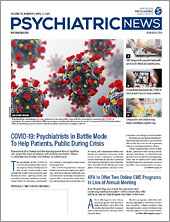People who have a history of severe infection such as hepatitis or sepsis may be more likely to develop substance-induced psychosis than people without such history, a study in AJP in Advance suggests. Substance-induced psychosis occurs during intoxication with drugs or alcohol and resolves after the person stops using the substance.
The results hint at the possibility of new treatments for psychosis, said lead author Carsten Hjorthøj, Ph.D., M.Sc., of Copenhagen University Hospital.
“We hope that it may be possible to treat at least some cases of psychosis using various immunotherapies, anti-infective agents, et cetera,” Hjorthøj told Psychiatric News. “Imagine if it becomes possible to use such medications rather than the usual second-generation antipsychotics for even a fraction of patients with psychosis.”
Hjorthøj and colleagues analyzed data from nationwide Danish registers that included all people born in Denmark since 1981. The authors were able to obtain information about people who experienced substance-induced psychosis, infections, or schizophrenia, as well as information about parental substance use disorders and psychosis. The final sample included more than 2.2 million people, among whom there were 3,618 recorded cases of substance-induced psychosis.
The risk of substance-induced psychosis doubled for the first two years after a severe infection and remained elevated for 20 years. Overall, a history of severe infection increased the risk of substance-induced psychosis by 30%, although some types of infections appeared to incur greater risk than others. For example, sepsis, skin infections, and urogenital infections were associated with a 50% increase in risk. Hepatitis tripled the risk, even after the researchers accounted for substance use disorders, which carry their own risk of psychosis.
In a secondary analysis, the researchers sought to tease out whether severe infection increased the risk of converting from substance-induced psychosis to schizophrenia. They excluded 351 people from the primary analysis who had a diagnosis of schizophrenia before their substance-induced psychosis. Among the 3,267 remaining people, 813 converted to schizophrenia. Again, those who had a history of hepatitis appeared to face the greatest risk: After 20 years, 57.5% had converted to schizophrenia, compared with 37.3% of people without a history of severe infection.
Hjorthøj said the reasons for the link between hepatitis and both substance-induced psychosis and conversion to schizophrenia are unclear.
“It could be a case of severe substance use that hasn’t been otherwise diagnosed, thus indicating some potential residual confounding. But at least one other study has found the same association for psychosis in general, so perhaps this also feeds into [an existing] gut-brain interaction hypothesis, which is also of much interest in studies on psychosis,” Hjorthøj said. “However, I think that for now we should be cautious not to overinterpret this finding.”
Hjorthøj noted a dearth of studies on substance-induced psychosis and called for further research.
“I think it has received so little research attention because the etiology seems so straightforward: Just don’t use substances, and these disorders won’t occur,” he said. “But guess what? People will continue to use substances, and more research is needed both to prevent substance use leading to psychosis and to develop better treatments.”
This study was supported by a grant from the Lundbeck Foundation Initiative for Integrative Psychiatric Research–iPSYCH. ■
“Infections as a Risk Factor for and Prognostic Factor After Substance-Induced Psychosis” is posted
here.

